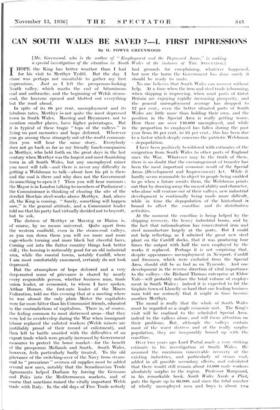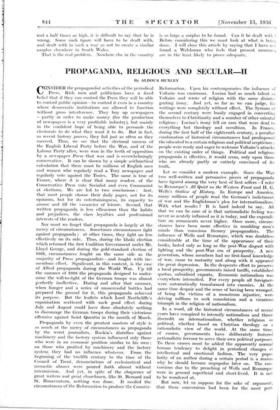CAN SOUTH WALES BE SAVED ? I. FIRST IMPRESSIONS
By H. POWYS GREENWOOD
[Mr. Greenwood, who is the author of " Employment and the Depressed -treas.'. is snaking a special investigation of the situation in South. Woks at the instance of THE SpEcTATou.l IHOPE the King has better weather than I had for his visit to Merthyr Tydfil. But the day I chose was perhaps not unsuitable to gather my first impressions. Just as I left the prosperous-looking Neath valley, which marks the end of bituminous coal and anthracite, and the beginning of Welsh steam- coal, the heavens opened and blotted out everything bat the road ahead.
In spite of its 60 per cent. unemployment and its fabulous rates, Merthyr is• not quite the most depressed town in South Wales. Maesteg and Brynmawr, not to mention smaller places, have higher percentages. But it is typical of these tragic " tops of the Valleys " in living on past memories and hope deferred. Wherever you go among these strangely out-of-the-world commun- ities you will hear the same story. Everybody does not go back as far as my friendly lunch-companion in Merthyr, who held forth on the great days in the last century when Merthyr was the largest and most flourishing town in all South Wales, but any unemployed miner you meet will talk—and there is never any difficulty in getting a Welshman to talk—about how his pit is there and the coal is there and why does not the Government do something to open it ? Then you will hear rumours : the Mayor is in London talking to members of Parliament ; the Commissioner is thinking of clearing the site of the derelict Dowlais steel-works above Merthyr. And, above all, the King is coming. " Surely, something will happen now," is the general attitude, and a Communist leader told me that his party had virtually decided not to boycott, but to ask.
The distress of Merthyr or Maesteg or Blaina is, of course, by no means universal. Quite apart from the western coalfield, even in the steam-coal valleys, as you run down them you will see more and more cage-wheels turning and more black but cheerful faces. Coming out into the flatter country things look better still; the housing is noticeably good for an old industrial area, while the coastal towns, notably Cardiff, where I am most comfortably ensconced, certainly do not look depressed.
But the atmosphere of hope deferred and a very deep-rooted sense of grievance is shared by nearly every responsible person, whether business man, trade union leader, or economist, to whom I have spoken. Arthur Horner, the first-rate leader of the Miners Federation, told me this evening that at a meeting where he was almost the only plain Mister the capitalists were far more bitter than his Communist friends, educated in the contradictions of capitalism. There is, of course, the feeling common to most distressed areas—that they were led to overdevelop during the War when immigrant labour replaced the enlisted workers (Welsh miners arc justifiably proud of their record of enlistment), and then left to battle unaided with the difficulties of an export trade which were greatly increased by Government measures to protect the home market—for the benefit of the prosperous Midlands and South. South Wales, however, feels particularly badly treated. To the old grievance of the switching-over of the Navy from steam- coal to " precarious " oversea oil supplies must be added several new ones, notably that the Scandinavian Trade Agreements helped .Durham by forcing the Germans and Poles into the Mediterranean markets, and of course that sanctions ruined the vitally important. Welsh trade with Italy. In the old days of Free Trade nobody had grounds for complaining, whatever happened. but now the harm the Government has clone surely it should be ready to undo.
No one believes that South Wales can recover wit bout help. At a time when the iron and steel trade is booming, when shipping is improving, when most parts of Great Britain are enjoying rapidly increasing prosperity, and the general unemployment average has dropped to 12 per cent., even the better situated parts of South Wales are little more than holding their own, and the position in the Special Area is really getting worse. Here there are over 140,000 unemployed, and while the proportion to employed has fallen during the past year from 38 per cent. to 34 per cent., this has been due to a factor which deeply concerns the patriotic Welshman —depopulation.
I have been positively bewildered with estimates of the emigration from South Wales to other parts of England since the War. Whatever may be the truth of these, there is no doubt that the encouragement of transfer has been the most important economic result of the Special Areas (Development and Improvement) Act. While it hardly seems reasonable to object to people being enabled to go when a future awaits them, the Welshman points out that by drawing away the 11101 of ability and character, who alone will venture out of their valleys, new industrial development is continually being made more difficult, while in time the depopulation of the hinterland is bound to affect the coastline and its distributive activities.
At the moment the coastline is being helped by the shipping recovery, the heavy industrial boom, and by the fact that rationalisation has concentrated iron and steel manufacture largely at the ports. But I could not help reflecting, as I admired the great new steel plant on the Cardiff docks, that it was producing four times the output with half the men employed by the works it replaced. Perhaps it is not surprising that, despite appearances unemployment in Newport, Cardiff and Swansea, which were excluded from the Special Area, should still be as bad as on Tyneside. And one development in the reverse direction of vital importance to the valleys—the Richard Thomas enterprise at Ebbw Vale—will probably reduce the total volume of employ- ment in South Wales ; indeed it is expected to hit the tinplate town of Llanelly so hard that one leading business man told me seriously that it might in time become another Merthyr.
The moral is really that the whole of South Wales must be regarded as a single economic unit. The King's visit will be confined to the scheduled Special Area. indeed to the valleys alone, and will focus attention on their problems. But, although the valleys contain most of the worst distress and of the really surplus population, they arc inseparably bound up with the coastline.
Over two years ago Lord Portal made a very striking estimate in his investigation of South Wales. He assumed the maximum conceivable recovery of the existing industries, and particularly of steam coal, added in all possible secondary effects, and calculated that there would still remain about 44,000 male workers absolutely surplus to the region. Professor Marquand, in his remarkable book, South Wales Needs a Plat puts the figure up to 60,000, and since the total number of wholly unemployed men and boys is about two and a half times as high, it is difficult to say that he is wrong: Some such figure will•have to be dealt with, and dealt with in 'such- a way as not to create a 'similar surplus elsewhere" in South Wales. That is the real problem. Nowhere else in the country is so large a surplus to be found. Can it be dealt with ? Before considering this we must look at what is being done. I will close this article by saying that I have not found a Welshman who feels that present measures are in the least likely to prove adequate..















































 Previous page
Previous page